Can AI Restore Search's Original Intention with DeepSeek?
![]() 03/02 2025
03/02 2025
![]() 613
613
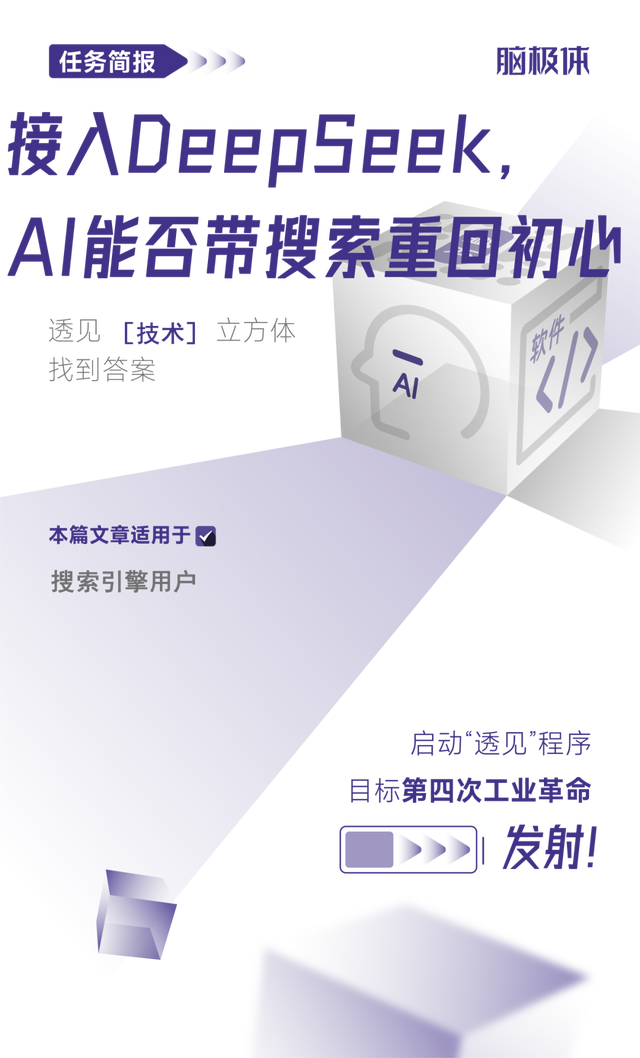
The dawn of 2025 belongs to DeepSeek. Following the release of its R1 large model, DeepSeek captured global attention, igniting a "fusion frenzy" across various industries. Among the companies swept up in this wave, one stands out: Baidu.
On February 16, Baidu announced the full integration of its search and Wenxin Intelligence platform with DeepSeek, introducing the latest deep search capabilities of the Wenxin large model. Users can now access the full-featured DeepSeek for free on both the Baidu APP and PC. Despite years of involvement in large models, Baidu had yet to produce a model with the same impact as DeepSeek, leading to some controversy. This time, Baidu search swiftly integrated DeepSeek, placing prominent entry points on both PC and APP. This move sparked lively discussions among netizens, some poking fun at Baidu for joining the competition after a perceived lack of success.
However, amidst the jesting, a significant shift in sentiment emerged. Many users found that Baidu search had indeed become more useful recently. For instance, a casual search reveals the latest trend in user reviews:
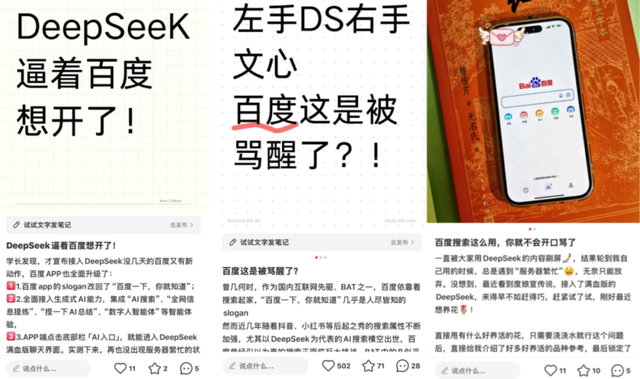
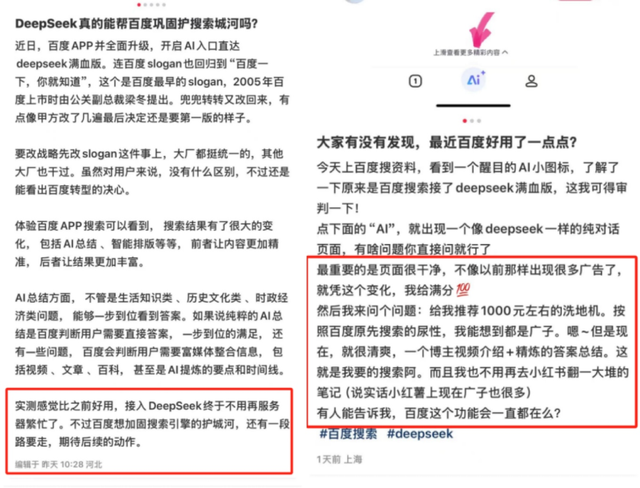
We were curious about this change in user perception. Through sources close to Baidu, we learned that for a long time, Baidu's AI search has been exploring technological changes, attempting to balance traditional search capabilities with the disruptive power of generative AI, including the integration of DeepSeek. These product changes have led to shifts in user experience, reflecting evolving user needs.
From the perspective of these evolving needs, we ask: In the post-DeepSeek era, can Baidu search, amid its ongoing efforts to address long-standing issues, turn the tide?

Recently, Baidu's core search business has undergone significant transformations. On February 24, the Baidu APP introduced a new AI entry point, integrating the capabilities of the Wenxin large model and DeepSeek, upgrading and consolidating experiences such as "AI Search," "Extracting Information from the Entire Web," "AI Summary with a Pinch," and "Digital Human Intelligence." Not only did the central button on the Baidu APP change to "AI," but the PC version's homepage also prominently featured a button labeled "Experience AI Search DeepSeek-R1 Full Version Now," both directing users straight to the AI search page.
This upgrade means that using AI search on Baidu will be more accessible for users, providing more straightforward and clear access to large models. Consequently, users' search behavior has changed rapidly. Notably, there has been a significant increase in demand for subjective, companionship-oriented searches.
Specifically, with the seamless integration of DeepSeek into Baidu search, users have significantly increased their personalized interactions with the search engine. Traditionally, search engines, as tools for information acquisition, struggled to provide personalized companionship such as chatting, comfort, or encouragement. However, after integrating DeepSeek, a substantial number of users have started using Baidu search for subjective Q&A, casual chatting, and even purely personal content like fortune-telling analysis and gossip discussions.
For example, amidst the recent surge in AI popularity, ordinary people are easily concerned about whether AI will replace their jobs and deprive them of development opportunities. These concerns manifest as questions like this on Baidu search: "How will society develop in the future? Will humans stop working due to the emergence of AI?"
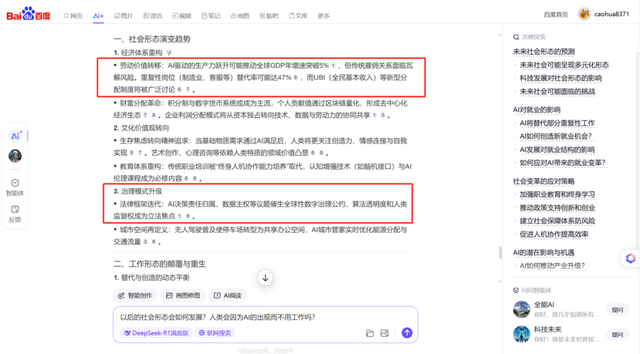
The R1 large model can analyze such grand issues in great detail, providing comprehensive answers with its unique "grand narrative" style. Regardless of whether these answers are right or wrong, they instill a sense of inexplicable reassurance, making users feel that, whether AI replaces them or not, at least they have learned something from AI today.
If users prefer not to delve into such grand issues, they can also have some simple fun with AI, such as asking about their horoscope for the next month.
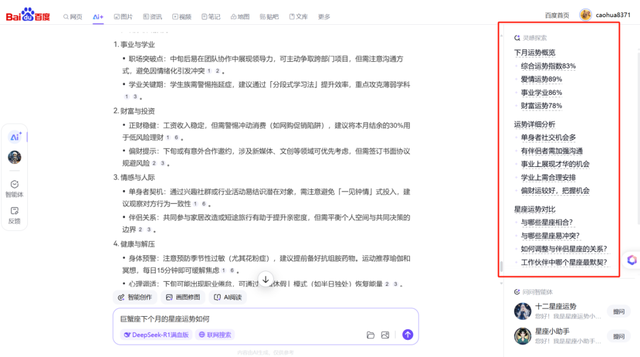
These new user search behaviors demonstrate that users are eager to engage in personalized, subjective chats with AI, even treating AI as an online friend. Further extrapolation suggests that users will spend a significant amount of time, previously dedicated to social media platforms, transitioning to search engines. Search engines are evolving from quick-in-and-out tools to long-term companions.
Of course, for search engines to truly become companions, more needs to be achieved. For instance, Baidu still lacks a search + social layout and cannot connect people through social sharing like Tencent Yuanbao. It is evident that after changes in search needs, search engines have much work ahead.

Moreover, integrating DeepSeek has made the questions users ask on Baidu search more complex and professional, shifting from simple information search to seeking advice, data organization, and solutions. The enhancement of AI search's professional capabilities also means changes in its role in personal life and work.
For example, users may ask, "When did the United States impose a 25% tariff on steel from China? What tax is currently levied on the export of steel structure products to the United States?"
Even for such highly specialized questions, AI search can provide very detailed answers, offering action suggestions, precautions, and other key factors, potentially exceeding the questioner's needs and bringing numerous additional values.
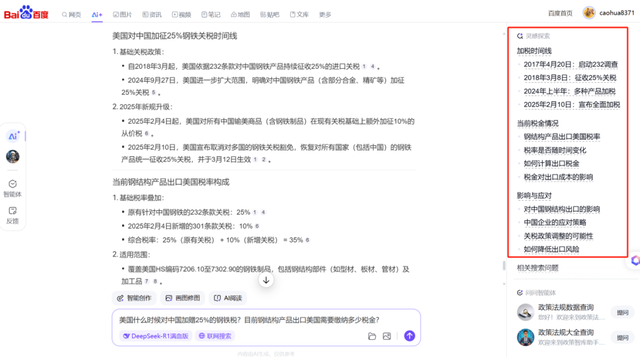
Meanwhile, value always stems from comparison. Traditional search engines or social media searches present information in multiple, massive, and fragmented formats, requiring users to open individual web pages or social sharing content to sift through and select useful information, manually completing recording and information organization in at least four steps. In contrast, AI search can achieve this in one step, providing complete and clear information organization after asking a question, significantly enhancing the efficiency with which search engines meet user needs.
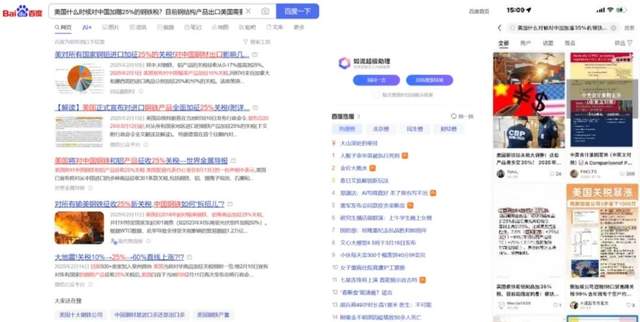
As a result, the professionalism of search engines in our lives and work will be greatly enhanced. Their value will evolve from basic information acquisition to industry assistants and productivity tools.
In addition, users also tend to use Baidu search for copywriting, advertising slogans, promotional words, and the creation of various materials. Programming professionals prefer using Baidu search for code generation, with a notable increase in code-related needs. For instance, users can ask AI search, "If I am a health blogger, can you provide me with 5 WeChat public account push topics?"
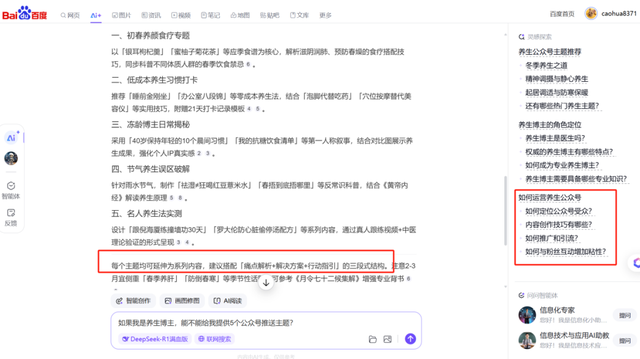
AI search can immediately provide detailed topic planning and execution schemes, along with an inspiration exploration area for further inquiry, greatly facilitating self-media creation.
Changes in user needs reflect their acceptance of Baidu's AI search's ability to seamlessly integrate the full-featured R1 large model in the most convenient way and their rapid discovery of new ways to leverage these AI search capabilities. To accommodate these changes in user search behavior, Baidu search has also completed a series of upgrades and adjustments.

As users gradually get accustomed to the AI search mode and Baidu's reputation improves, we can sense that the core lies in the evolving value of the AI search sector itself, such as:
The positioning of search has shifted from information acquisition to long-term companionship. Search is transforming from a "short, flat, and fast" information source into a new information acquisition style and communication tool that can provide a sense of companionship and interaction. Consequently, search engines' presence in daily life will greatly increase, and their role will iterate. Both vendors and users will reassess the time spent on search.
The value of search has shifted from basic information collection to a professional productivity tool. In the era of AI search, search engines will transform from information collection tools to super tools for learning and work. Whether it's information organization, data analysis, professional ability output, content creation, or code assistance, these tasks can be completed within search engines. The value of search will thus leap, becoming a gateway for the release of new-quality productivity.

The focus of search has fully returned to user experience. After changes in user search behavior, search engines need to reconsider how to retain users. At this stage, returning to the original intention of user experience is paramount. For instance, Baidu's willingness to fully integrate DeepSeek into its search engine can be seen as breaking down ecological barriers to meet user needs.
Recently, "Baidu it, and you'll know" has returned to the splash screen of the Baidu APP. The logical core behind this is that in the AI era, the definition of "knowing" has been rewritten. It's no longer merely about acquiring information through search engines; it's about making search more personalized and understanding users better. This involves combining the reasoning and thinking capabilities of large models to enable AI to deeply understand user intent and provide personalized search results, making search results more diverse and intelligent. Instead of just text answers, users now get AI summaries, videos, timelines, digital human intelligence, and other multi-modal content, allowing them to directly obtain refined results. Moving closer to and advancing with AI has almost become a certain direction for the search field.
AI seems to be bringing search back to its original intention of user experience, returning to what search should have been in the first place.









